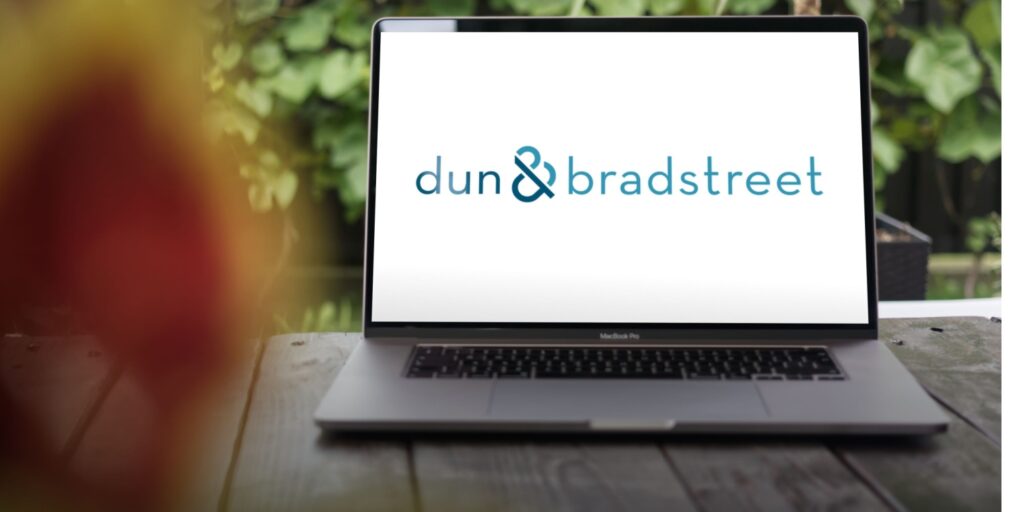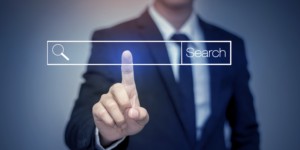‘D-U-N-S Number’ is short for Data Universal Numbering System Number. It’s a unique nine-digit code associated with business reporting and identification on a location-specific basis. Dun & Bradstreet (D&B), a leading global provider of commercial data, analytics, and insights for businesses, assigns all registered business entities worldwide a D-U-N-S Number.
In this post, we explain the purpose of these identification codes, where to find the D-U-N-S Number for your business, and how to use the D&B lookup tool to search for numbers of other firms you are considering doing business with.
What is a D-U-N-S number?
Conceived in 1963 by business data specialists Dun & Bradstreet, the data universal numbering system is a globally recognised system for identifying and accessing up-to-date business information.
Every registered business and organisation has a unique nine-digit D-U-N-S Number. This is the identifier for its Dun & Bradstreet ‘Live Business Identity’—the most comprehensive and continuously updated profile of information of any business in the Data Cloud.
The Live Business Identity profile contains a D&B credit file on the business, which will typically include the following information:
- Firmographic data – i.e. company name, registered office or business address, phone number, email addresses, etc
- Corporate family relationships – e.g. its headquarters, branches, parent company, subsidiaries, etc
- Predictive and performance-based scores and ratings that assess various financial health indicators of the business. These include D&B PAYDEX, D&B Financial Stress Score, D&B Delinquency Predictor Score, suits, judgements, liens, payment history, and other information that may be helpful to businesses in their decision-making
A D-U-N-S Number enables potential lenders and partners to access this information, gaining insight into a business and ascertaining how financially reliable it is. Essentially, the system facilitates reciprocal due diligence, business relationship insight, and informed decision-making on a global scale.
To understand and appreciate the purpose of the number, you should consider it from three perspectives:
1. Used by other businesses to complete a check on your business
Any business that subscribes to Dun & Bradstreet’s services and has, or may soon have, a vested interest in your operation may decide to carry out a check using your D-U-N-S Number. For example, if they are considering giving you a loan or offering you a large contract or supplier account.
2. To carry out a check on another business
If you subscribe to a Dun & Bradstreet service, you can use the D-U-N-S Number of another business to complete a check on them. For example, if you are considering partnering up with another company or are about to accept a large order from a new client.
3. To monitor your own business
You can look up your own business to check your ESG score (an evaluation of your company’s performance measured against Environmental, Social, and Governance criteria), access your business credit file, and gain valuable insight to protect and grow your business. This will also help you understand what information is available to others and how they may regard your business.
Do I need a D-U-N-S Number?
Ultimately, it depends on the scale of your business and any future growth plans. Large businesses and public sector bodies will often request your D-U-N-S Number when looking to work with you, particularly if they are based internationally.
Whilst there are multiple ways for a business to complete checks on other firms, the D-U-N-S Number is the most globally recognised avenue for doing so. According to Dun & Bradstreet, there are currently ‘500 Million D-U-N-S Numbers (and Counting)’.
By simply having one, you can create the impression of an ambitious company with global aspirations. It can help you establish credibility with lenders, expedite applications for contracts and loans, verify the legitimacy of your business, and enable third parties to gauge your firm’s creditworthiness as a customer, supplier, or business partner.
Do all companies have this number?
All legally registered companies in the UK, Ireland, and beyond have a D-U-N-S Number. Many small companies may not be aware of them, but they can find or request their unique number from Dun & Bradstreet.
How to get a D-U-N-S Number for your business
If you own a UK limited company, obtaining this number for your business is extremely easy. To do so, follow these simple steps:
- Visit the Dun & Bradstreet D‑U‑N‑S® Number Lookup tool
- Scroll down to the blue section of the page and choose whether to search by company name (in the search box on the left) or registration number (in the search box on the right)
- Enter the name or registration number of your business
- In the pop-up box, enter the post town and/or postcode of your business, then select ‘United Kingdom’ or ‘Ireland’ from the drop-down menu
- Click ‘Search Now’ and scroll down to view the results
- If your business has a D-U-N-S Number, you will see its registered name, address, and any corporate family relationships (e.g. whether it’s a ‘subsidiary’ or ‘parent’) on the screen
- Click ‘Select’ next to your business details
- Enter your name and email address, then click ‘Submit’ to receive your D&B D-U-N-S Number by email
A message will appear on the screen to confirm that the requested number has been sent to your email address. It should arrive within a few minutes.
Can sole traders obtain one?
Yes, sole traders and general partnerships can also obtain a D-U-N-S Number. However, if you can’t find it using the lookup tool, you must request one from Dun & Bradstreet. We explain the process below.
How to look up the D-U-N-S Number of another business
You can look up this number online for any registered business or organisation worldwide. To find the number for a business based in the UK or Ireland, follow the steps outlined above. If the business is registered anywhere else, you’ll need to select and visit the relevant international site to find its D-U-N-S Number.
Can’t find your D-U-N-S Number online?
If you’re unable to find the number for your UK or Irish business using the D‑U‑N‑S Number Lookup, you can contact Dun & Bradstreet online to request one.
To do so, follow these steps:
- Visit https://www.dnb.co.uk/duns-number/lookup/request-a-duns-number.html
- Specify where your business operates from (choose from the dropdown list on the screen)
- Specify whether your business is registered at Companies House
- Click ‘Request D-U-N-S Number’
- Enter your full name, email address, and contact number
- Select one of the following to indicate your relationship to the business – ‘I work for the business’ or ‘I do not work for the business’
- Select the industry that most closely indicates what your business does
- Enter the number of full-time employees your business has, including owners for sole trader and partnership businesses
- Select your legal structure from the drop-down list (e.g. limited company, sole trader)
- Provide the date when your business started
- Specify whether the business previously traded under different ownership
- Select your title (e.g. Mr, Ms), enter your full name and start date with the business, then click ‘Next’
- Enter the particulars of the business – its registered name and any other trading name(s), address, country of registration, telephone number, and website address (where applicable)
- Click ‘Submit request’
After submitting the form, you’ll receive a confirmation email with the Request Reference Number. A Dun & Bradstreet Customer Service Analyst will review your request and respond within five working days.
Why would it be unavailable online?
There are two reasons why you may be unable to find your number using the online lookup tool:
- The phone number or address in your Dun & Bradstreet profile doesn’t match the information you entered in the lookup tool. This may happen if you’ve moved your business to a different location or changed phone numbers since first requesting your D-U-N-S Number
- Your business doesn’t yet have one
If you realise that certain information may be out of date, you can update your Dun & Bradstreet business profile online.
How much does it cost?
You don’t have to pay anything to obtain the D-U-N-S Number for your own business. It’s also free to look up the numbers of other firms and update business details in your D&B profile online.
However, you will need to subscribe and pay to use the other services, including business credit checks and monitoring.
My business is not in the UK – can I still get a number?
Yes. The Dun & Bradstreet Data Universal Numbering System is used globally. However, you can’t use the UK site to request or look up a D-U-N-S number for any business located outside the UK and Ireland. You need to select and visit the relevant international site for the country where your business is registered.
The difference between a D-U-N-S number and a company registration number
While they are both used for identification purposes, a D-U-N-S Number differs completely from a company registration number (CRN).
All types of registered businesses worldwide can obtain a D-U-N-S Number. These unique nine-digit codes are issued and maintained by Dun & Bradstreet to verify corporate and financial information relating to individual businesses.
- How to register a company in 4 simple steps with 1st Formations
- How to register a company in 4 simple steps with 1st Formations
On the other hand, a company registration number is assigned to a company upon its incorporation in whichever company it is registered. It is used to identify and verify the legal existence of a company.
In the UK, CRNs contain either eight digits or two letters followed by six digits. They are issued by Companies House, the registrar of companies for the UK. You can look up the CRN of any UK-registered company free of charge online through Companies House Service.
Thanks for reading
We hope this article has helped you understand the D-U-N-S Number, including how to obtain one for your business and how to look up the number of other businesses you may have dealings with.
If you have any questions, please leave a comment below and we’ll respond as soon as possible.
Please note that the information provided in this article is for general informational purposes only and does not constitute legal, tax, or professional advice. While our aim is that the content is accurate and up to date, it should not be relied upon as a substitute for tailored advice from qualified professionals. We strongly recommend that you seek independent legal and tax advice specific to your circumstances before acting on any information contained in this article. We accept no responsibility or liability for any loss or damage that may result from your reliance on the information provided in this article. Use of the information contained in this article is entirely at your own risk.











Join The Discussion
Comments (2)
Excellent article! This DUNS number knowledge is highly appreciated for my own personal tax advisory UK business.
Thank you for your comment, David.
Kind regards,
The 1st Formations Team